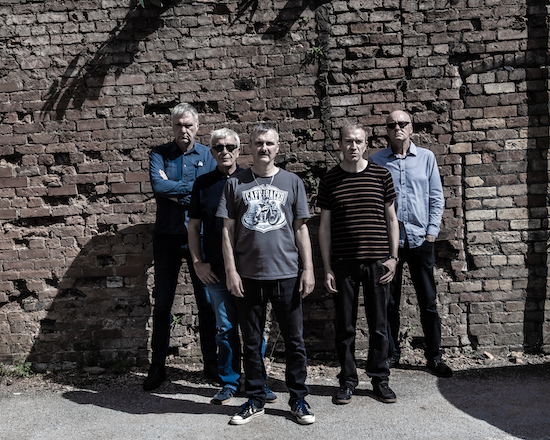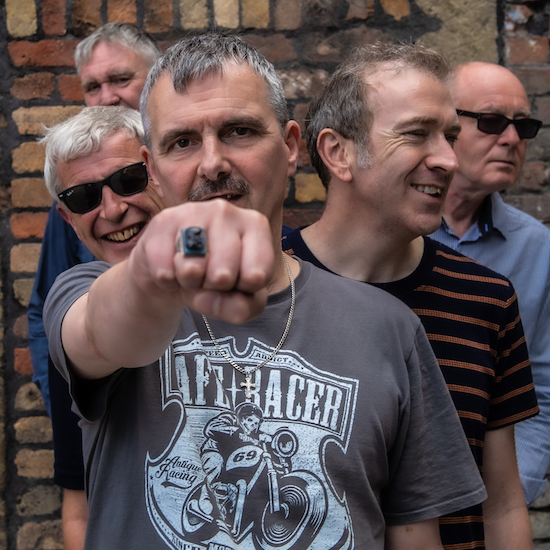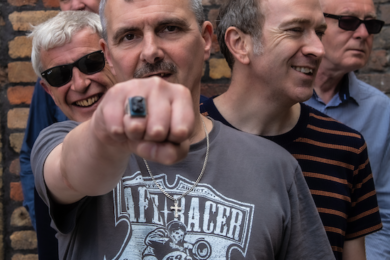"Of course, we’re not actually here to talk about The Fall," says Paul Hanley, sitting down with his pint of lager, "but then we’re not here to not talk about The Fall either."
As the members of House Of All congregate at a good old-fashioned boozer opposite Manchester Piccadilly station, the early conversation has, inevitably, focused on the legacy of Prestwich’s greatest musical institution. Steve Hanley, The Fall’s bassist for nearly twenty years (and, to many people – Mark E Smith included – the very definition of ‘the Fall sound’) is pleasantly surprised that his memoir, The Big Midweek, "just keeps selling". His brother Paul, drummer in what many would regard as the group’s classic early 80s line-up that recorded Slates and Hex Enduction Hour, expresses amazement at the "continuing appetite" for Fall-related product. Simon Wolstencroft, the affable drummer who joined the group in the commercially successful mid-80s and slugged it out until the late 90s, is delighted that "young people often come up to me and tell me how they’re into The Fall."
"These days", as it says on the Bandcamp page for House Of All’s forthcoming eponymous album, "everyone seems to love The Fall."
Although it is House Of All that we are here to discuss, it is impossible to separate the band from its Fall connections, given that they are the very basis of its existence. The driving force behind the project is Martin Bramah, founder member of The Fall, whose resignation from the group shortly after the release of their debut album Live At The Witch Trials marked the beginning of Smith’s unrivalled dominance of the group. He rejoined in 1989, making a significant contribution to the critically and commercially successful Extricate before being unceremoniously sacked. A move back to Manchester last year inspired him to assemble a band made up of ex-Fall members. A chance meeting with Simon Wolstencroft got things underway; the Hanley brothers followed soon after.
I ask the obvious question about notable former Fall hands Marc Riley and Craig Scanlon. "Marc’s a definite no", Bramah says, "he’s very supportive of what we’re doing, but he’s drawn a line under his musical career." As for fan favourite Scanlon, the timing wasn’t right, but "he certainly did consider it" and he has "not ruled out" his future participation. Although there is a multitude of ex-members to choose from, there’s no intention to ask anyone else, it would seem.
The fifth member of House Of All is Pete Greenway, The Fall’s guitarist in their final decade. I suggest that many fans of the group’s later work will be delighted by his inclusion. "Absolutely", Bramah agrees, "his involvement was the icing on the cake." Throughout the interview, it’s clear that the old hands value Greenway’s contribution enormously, even if they are not hugely familiar with a lot of the group’s later work (although the Hanley brothers are effusive in their praise for the riff on "Wolf Kidult Man").
Bramah has stated that the band’s name came from him "looking at Latin words" (domus omnium) and there are also tracks called ‘Dominus Ruinea’ and ‘Minerva Disrobed’; I ask if he has been studying classics. "Well, I like to read," he smiles. "It’s something a bit different; an angle not many people take." Bramah wrote all the lyrics: "They were prepared in advance", he says, "I had a set of ideas and then I had to match them to the music that emerged – it was like a puzzle to be solved." There are, I point out, a lot of references to evil and death. "That’s true: there’s a darkness to the lyrics, but there’s also a sense of humour that cuts through it all." Bramah is reluctant to dissect the language he deploys on the album: "I don’t want to talk about the exact meaning of every lyric – they’re there for people to extract their own meaning." Steve Hanley agrees: "People should interpret a lyric in their own way, that’s part of the joy of it…’ His brother chips in: "…otherwise you’d have no Annotated Fall (the exhaustive lyric analysis site run by American fan ‘bzfgt’ and renowned Fall investigator ‘dannyno’)."
That said, the bassist is, like me, keen to know the identity of "the only white man on the east coast" whose death is announced in album opener ‘Aynebite’. But Bramah prefers to let the audience come to their own conclusions. Further enquiries elicit similarly evasive responses, although I do learn that ‘But Wilful I Am’ is "a kind of Catholic confessional" and concluding track ‘Turning Of The Years’ is about nostalgia and regret.
The two songs made available in advance of the album’s release prompt the most informative responses. ‘Magic Sound’, a joyous glam stomp, aims to capture the musicians’ renewed enthusiasm for recording music, the references to ‘Bay City Pistols’ reflecting the sound they were aiming for. The first track to emerge, the well-received ‘Harlequin Duke’, was taken by many to be a tribute to Mark E Smith, given lines like "our bingo master has returned/ glint in his eye".
"Yeah, many people have made that assumption," Bramah says, ‘and I’m not going to say that there’s nothing in that, but people did leap to the conclusion that the ‘harlequin’ was a reference to that picture of him in the jumper, but that had honestly never occurred to me."
I put it to Bramah that ‘Harlequin Duke’, with lines like "necklace of gouged-out eyes" and "quintessence of horror" has a distinctly Lovecraftian air (H. P. Lovecraft being a well-known MES favourite), a comparison with which he seems pleased. You must, I ask, have been aware that your lyrics and vocals would be compared with Mark’s? "Of course. It wasn’t a case of trying to emulate Mark, but I wanted to catch an echo of him in both the vocals and the vocal delivery. It’s clear, I think, that this isn’t just a Blue Orchids – Bramah’s main post-Fall group – album recorded with ex-Fall musicians." This is indeed true: House Of All has a sleek, muscular sound that differs notably from the sparse, scratchy intensity that is the hallmark of the Blue Orchids’ work. It also, I suggest, doesn’t really sound much like The Fall, with which the band agree. The only close comparisons I can see are the chanting ‘Dominus Ruinea’, which has the air of a more laid-back ‘Senior Twilight Stock Replacer’ (Greenway looks unconvinced; the rest clearly don’t know the song) and the relentlessness of ‘There’s More’, which brings to mind ‘I’ve Seen Them Come’ from Ersatz GB (a track that Greenway doesn’t even remember).
From Pete Greenway’s perspective, the recording of the album – which was done over three days at Hope Mill Studios in Ancoats, a stone’s throw from the pub we’re in today, with very little having been prepared in advance – was very similar to his Fall experience of "coming into the studio with just a few ideas to work on them and see what happens". The Fall’s final guitarist seems to have brought in most of the few pre-prepared musical ideas that they had, for example the naggingly circular riff of ‘Turning Of The Years’. It’s clear that the way the album was created felt like a sizeable gamble for everyone involved.
Paul Hanley says: "We were actually quite nervous about it. I mean, studio time is not cheap, so it was a risk to turn up with so little prepared. We had to accept the possibility that we might just come up with a load of shit." "Everyone chipped in", Simon Wolstencroft adds, "a couple of songs started off with Paul and I just playing around on the drums."
"’Magic Sound’ was one of those", Paul elaborates, "it started off with Si and me bashing out this rhythm and then Steve put down a trademark bass line and away it went."
Dual drummer line-ups are, of course, a notable feature of Fall history, from Paul and Karl Burns’ powerful partnership in the early 80s to Daren Garatt and Keiron Melling’s pulverising work on late-era classics like ‘Mister Rode’. Paul and Si have clearly had a great time working together on this album; a far cry from Wolstencroft’s unhappy experience with Burns in the 90s, where the most-often-sacked Fall member surreptitiously added bits of equipment each night. "We haven’t quite worked out the logistics yet", Paul Hanley comments, regarding the forthcoming live dates, "but we’ll both have the same standard kit."
The gigs that the group have lined up for in May are in relatively small venues, such as the White Hotel in Salford. Bramah points out that when the bookings were made, they didn’t have any songs, so they had no idea if they’d have anything to play. The general consensus amongst the group is that they prefer the atmosphere of small gigs anyway. But will they play any Fall covers?
"We had thought about doing one for an encore", Bramah says, "but I didn’t really want to do encores anyway. And then there’s the issue of the family not wanting us to use Mark’s lyrics." The reaction of the Smith estate to House Of All had made headlines a couple of weeks before our interview, a statement on the official Fall website expressing dismay at a perceived exploitation of the MES name, calling it "extremely offensive and very misleading". The band are understandably reluctant to discuss this at much length, and clearly feel that a line has been drawn under the issue, although Paul Hanley can’t help but express a little exasperation: "As far as they’re concerned, Mark was The Fall, but it’s not as if it’s the bass player from Simply Red trying to tour under the name!" So it looks like no Fall covers, although Bramah does hint that a song covered by the group may be a possibility. And apparently the songs from House Of All will sound "different" and "developed". A live album is also a possibility, it would seem.

This notion of MES being The Fall inevitably leads to discussion of the dreaded (and regularly misquoted) "granny on bongos" phrase. Unsurprisingly, they all find the quote frustrating and somewhat insulting. It has become part of The Fall mythology, I suggest, along with the idea that Smith sacked multitudes of musicians, when the majority actually walked out. ‘I had both,’ Bramah comments ruefully. I ask him about his abrupt dismissal (alongside keyboard player Marcia Schofield) in 1990. "I was very angry about it at the time; very cross. There’s no denying it. But I reconciled myself to it years ago." He tells me that Smith called him in 1999 to ask him if he’d play on a Peel session. "I would have done it with a bit of notice,’ he says, ‘but he only rang me the night before."
Si Wolstencroft has no regrets about his exit: "It was just the right time for me. The time around Middle Class Revolt when Mark brought Karl Burns back into the band was the beginning of the end for me. But I always got on well with Mark and I’d see him from time to time." Steve Hanley is, unsurprisingly, more vehement. "I should have gone earlier – no doubt." He jokes about needing years of therapy before he could listen to The Fall again, but it’s obvious that it’s taken him a long time to come to terms with the stress of sticking with MES for nearly twenty years.
The final Fall line-up seems to have been very settled and amicable. I ask Pete Greenway if he (or Keiron Melling and Dave Spurr) ever came close to walking out. "It was generally harmonious. I mean there were fallings out, but when Mark was being difficult we’d just play deliberately sloppily to piss him off! One time, he locked us out of the backstage area, and we got back at him by playing the first few songs really slowly. But no, I don’t think there was ever any question of Dave, Keiron or I walking out."
Earlier, Paul Hanley had pointed out that four of the six people around the table (your interviewer included) have published a book about The Fall (all via Route Publishing), so I ask Greenway if there’s any chance of the final line-up putting pen to paper. "I wouldn’t rule it out entirely, but it’s probably unlikely. There are lots of stories we’d never be able to tell," he adds tantalisingly. As for Bramah, he has considered it, but says he’s "not really interested in writing an autobiography – most people would just skip to the bits where I talk about Mark E Smith and I don’t want to feed that particular insatiable beast. I would consider maybe writing something covering the origin of The Fall and up to the recording of Live At The Witch Trials. Similar to what Paul did with Hex in Have A Bleedin Guess." An idea that is greeted with enthusiasm by all around the table.
I ask the band for their favourite Fall album that they didn’t play on. Greenway plumps for Palace Of Swords Reversed, one of the better Fall compilations. This leads to an energetic discussion of the slew of shoddy live/compilation releases that have emerged over the years, from which the ex-members see no financial benefits – although Live At St. Helens Technical College receives unanimous praise. Si goes for This Nation’s Saving Grace; the Hanleys’ choice is Live At The Witch Trials; Bramah’s favourite is Hex Enduction Hour, which also, he asserts, ‘has the perfect Fall cover.’ Which results in a discussion of the best and worst Fall sleeve art. Everyone agrees that Dragnet is great; Cerebral Caustic and Are You Are Missing Winner are heartily derided; Pete Greenway says that he ‘can’t think of a decent one’ from his time in the group; Steve Hanley reflects on being ‘obliterated by capital letters’ on The Frenz Experiment. The general consensus is that shit covers are a very Fall thing.
As we wind up our discussion, I ask what the future holds for House Of All. "I certainly don’t see it as a one-off", Bramah says. "We’ve recorded another album’s worth of material and now I have another set of lyrical ideas that I have to match with that music. We’ll just have to see where it takes us." It seems that the band feel a sense of serendipity about their work, exemplified by the cover art of their debut. The shot of the disused silk mill (opposite the recording studio) was captured "by happy accident" and seemed to "fit in with how the album itself just fell together".
"When we all came together to work on this project," Bramah says, "the one thing we had in common was the discipline we’d learned in The Fall. We naturally slipped into that mode and therefore it was almost as if Mark were just in the next room; the lingering sense of the same creative tension was there. MES was the hub that had brought us together once more. In that sense his presence was felt by us all."
Feature edited due to lack of clarity regarding interview recording, April 13
House Of All is released on 22 April. You Must Get Them All by Steve Pringle is published by Route



